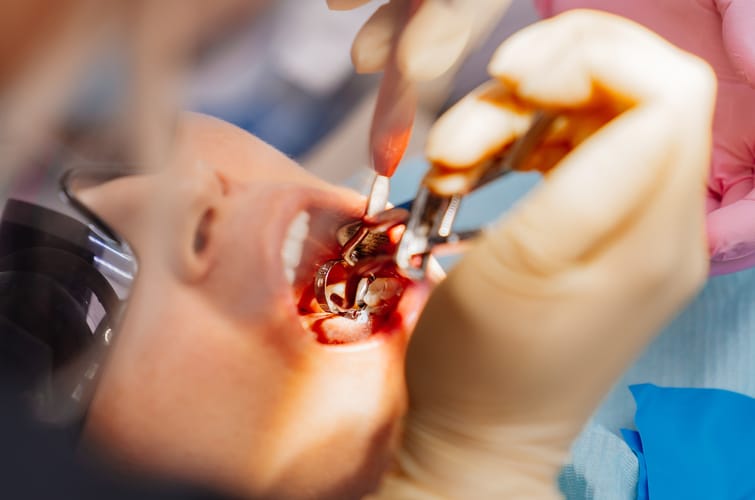Some people have wisdom teeth that grow in normally, and do not need to have their wisdom teeth removed. These people may experience mild wisdom teeth pain as they erupt, which is easily relieved with ice or pain medication; this pain caused by the teeth breaking through the gums goes away once the teeth have come through fully. However, if you experience persistent wisdom tooth infection symptoms like severe pain, swelling, difficulty opening your mouth, or foul taste/smell near the affected tooth, it’s crucial to seek dental care promptly to prevent further complications.
However, as many as 85% of people have complications with their wisdom teeth. Their wisdom tooth pain and swelling is caused by impacted wisdom teeth, and often oral or dental infections related to their complications. The overcrowding and other complications cause pain that is more extreme and often involves both dental pain and jaw pain.
Table of Contents
ToggleWhy Might You Need Wisdom Tooth Removal
There are many reasons why your dentist may decide it is better for your oral health to remove your wisdom teeth. An existing infected tooth, infected gums, or a higher risk for future infection are critical reasons for a wisdom tooth removal.
An impacted wisdom tooth can grow in at slanted and horizontal angles; this presses on adjacent teeth, causing pain, overcrowding, shifting teeth, and increased risk of tooth decay and gum disease as the misaligned teeth create areas that are difficult to clean.
Impacted wisdom teeth that do not emerge fully can create gum flaps for bacteria to collect in. The infection can then spread from the impacted tooth to other teeth and oral tissues. This infection from partially erupted wisdom teeth can develop into pericoronitis. This is a very serious infection around the wisdom teeth that creates significant swelling. The swelling extends into the neck and cheeks.
Impacted or partially erupted wisdom teeth can also lead to periodontal disease, an advanced gum disease that damages gums and eventually results in bone loss and other oral health issues.
Left untreated, infection from an impacted wisdom tooth can cause cysts and abscesses. Abscesses can spread infection throughout your mouth and into your lymph system through your blood.
If you experience pain from wisdom teeth coming in, or if your dentist recommends it during a checkup, it is best to have your wisdom teeth removed as soon as possible, before infection can set in.
Wisdom Teeth Infection Symptoms Before Extraction

If you are experiencing more than mild wisdom tooth pain as your wisdom teeth emerge, they may be impacted, and may also be infected. In addition to extreme tooth pain, if your jaw is very stiff, and it is difficult and painful to open your mouth, an infection is likely the cause. A fever, and swelling in the jaw and cheeks also indicate infection. Other symptoms include gums that are very red and inflamed, or bleeding when you brush or floss.
Wisdom Tooth Pain Relief
Some solutions can help manage pain for the short term until you are able to visit your dentist’s office for an extraction. It’s important to remember, though, not to use these instead of seeking treatment altogether.
For minor pain relief, over-the-counter medications can help. If you experience very sharp pain or pain that is too severe to be managed by over-the-counter pain solutions, see a dentist immediately.
There are some natural home remedies that can help, too.
Applying ice to the affected area is a natural remedy to reduce swelling and relieve pain around your wisdom teeth. A cold compress to reduce pain and swelling is also effective. Ice wrapped in a towel and held against the jaw for 20-minute periods every few hours works well. A salt water rinse is a good remedy for relieving pain and keeping the mouth clean to avoid infection.
Symptoms of Infection After Wisdom Teeth Extraction
In very rare cases, some people have an infection after having their wisdom teeth removed. After the wisdom teeth removal, infection symptoms include yellow or white pus or discharge, ongoing severe pain and swelling, and bleeding that does not subside after a couple of days.
Extreme pain that does not go away may be a symptom of a dry socket, while tingling and numbness in the jaw may indicate nerve injury.
See your dentist right away if you have symptoms of wisdom teeth infection.
Pain Relief After You Have Wisdom Teeth Removed

For the first couple of days after your wisdom tooth removal, there will be pain, but it is manageable and decreases until it is gone. Keeping the area clean helps prevent infection.
Over-the-counter medications can help relieve dental pain. Your dentist may also prescribe pain medications and medication to reduce inflammation. Cold compresses also help reduce excessive swelling.
Get Help
At Onyx Dental, we prioritize your comfort and provide expert wisdom teeth removal in Erin Mills with an in-house dental surgeon. Contact us at (905) 567-4999 or visit 2555 Erin Centre Blvd Unit 12, Mississauga, ON L5M 5H1 for your oral health needs.
</>



